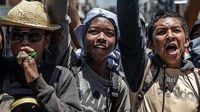For the young people who filled Madagascar's streets with protests over the past month, the toppling of President Andry Rajoelina by Col. Michael Randrianirina was a moment of both triumph and uncertainty. The military coup, which culminated in Randrianirina being sworn in as head of state on October 17, 2025, was met with widespread celebration across the country. Yet, for many of the movement’s youthful leaders and supporters, the euphoria has quickly given way to skepticism and a sense of unfinished business.
Donah Falia, a 20-year-old accounting student and one of the countless young protesters whose voices echoed through Antananarivo, summed up the mood in the aftermath. Despite the regime change, daily life remains a struggle. "For us, personally, there is no answer here yet. I still don’t see any hope for us," Falia told The Associated Press the day after the coup. His words reflect a broader sentiment among Madagascar’s youth: the old problems persist, and the new leadership has yet to deliver tangible improvements.
The protests that set the stage for the coup were sparked by chronic hardships—frequent water and power outages, soaring unemployment, and widespread poverty. For residents like Falia, waiting in long lines for water from neighborhood tanks because the taps work only at night—or sometimes not at all—remains a daily ordeal. The job market, too, has shown no signs of revival. As Falia put it, the change in government has brought “no immediate relief.”
According to BBC, the demonstrations began nearly a month ago, led by young people frustrated with the status quo. Their anger and sacrifices, fueled by daily indignities and a lack of opportunity, attracted broader support from other sectors of society. What started as a movement against utility outages quickly morphed into a nationwide demand for political change. When President Rajoelina’s calls for dialogue failed to quell the unrest, he went into hiding, with reports suggesting he had fled the country.
In the power vacuum, Col. Michael Randrianirina, leader of the elite CAPSAT army unit, stepped forward. His announcement that the military had seized control followed a familiar pattern in Madagascar, a nation of roughly 30 million people with a long history of coups since gaining independence from France in 1960. Randrianirina’s swearing-in, conducted in civilian clothes, was accompanied by an address to the nation in which he acknowledged the pivotal role of the youth. "With a people in full fervour, driven by the desire for change... we joyfully open a new chapter in the life of our nation," he declared.
Yet as the celebrations faded, the new administration’s first major decision reignited tensions. On October 20, 2025, just three days after taking office, Randrianirina appointed businessman Herintsalama Rajaonarivelo as prime minister. The move was met with immediate backlash from Gen Z Mada, the youth movement that had been at the forefront of the protests.
In a statement posted on Facebook, Gen Z Mada criticized the appointment as "non-transparent" and "without consultation." The group argued that Rajaonarivelo’s selection "runs contrary to the desired structural change" they had fought for, especially given what they described as his ties to the previous government. Their message was unequivocal: "Our revolution will not be hijacked. The Malagasy youth are watching and mobilising."
Gen Z Mada’s concerns center on the fear that the new regime may simply recycle the old guard’s methods. As the group put it, "We will not allow the failed methods of the past to continue in a new form." They have demanded a clear explanation of how Rajaonarivelo was chosen and have warned that they will continue to monitor the administration’s actions closely. While they have not specified what steps they will take if their demands go unmet, their resolve is clear.
The current situation echoes Madagascar’s recent history. When Rajoelina himself first came to power in 2009, it was also through a military coup that was initially celebrated as a break from the past. But as many Madagascans now recall, the promise of transformative change soon gave way to disappointment as the same systemic problems persisted. This time, young people like Falia and the broader Gen Z Mada movement are determined not to let history repeat itself.
The underlying issues that fueled the protests remain unresolved. Unemployment is still rampant, poverty is widespread, and basic services like water and electricity are unreliable at best. For many, the hope is that Randrianirina will make good on his promise to eventually cede power to a civilian government—a promise that, if unfulfilled, could reignite unrest.
International observers have noted the familiar pattern of military intervention in Madagascar’s politics. Since the end of French colonial rule, the country has experienced repeated cycles of popular uprisings, military takeovers, and promises of reform, only to see hopes dashed time and again. The current coup, while welcomed by many as a necessary step to end Rajoelina’s rule, is viewed with caution by those who remember the unkept promises of the past.
The Gen Z Mada movement, with its savvy use of social media and ability to mobilize large numbers of young people, represents a new force in Malagasy politics. Their insistence on transparency and genuine structural change has resonated with a population weary of empty rhetoric. As they continue to press for answers and accountability, the trajectory of Madagascar’s political future may well hinge on whether the new administration responds to their demands or reverts to old patterns.
For now, the streets of Antananarivo are quieter, but the sense of watchfulness remains. The youth who drove the protests are not content to fade into the background. As Gen Z Mada’s statement made clear, they believe the revolution they started is far from over. Whether Randrianirina’s government will deliver the change they seek—or simply offer more of the same—remains to be seen. For young people like Donah Falia, the wait for water continues, but so does the hope for a better future.

